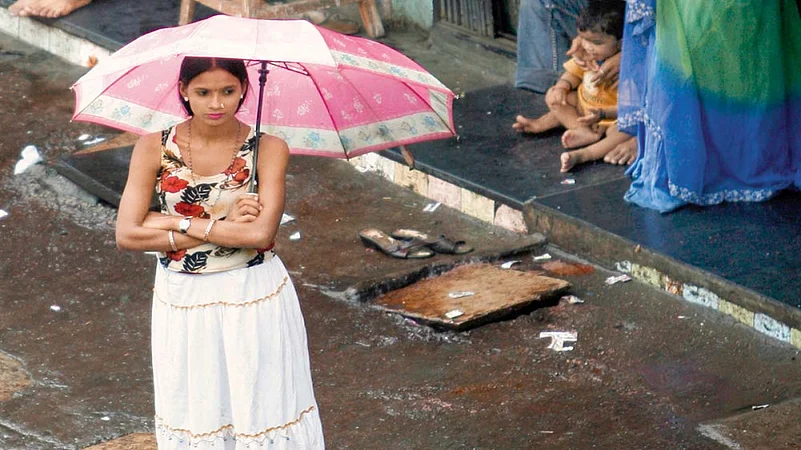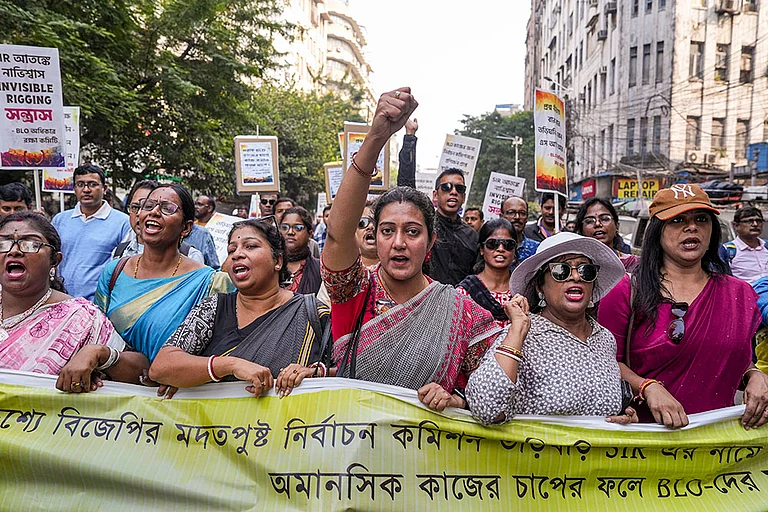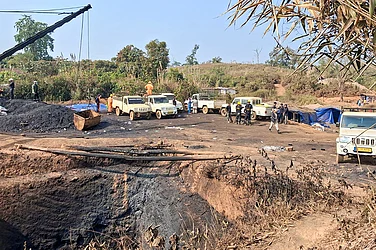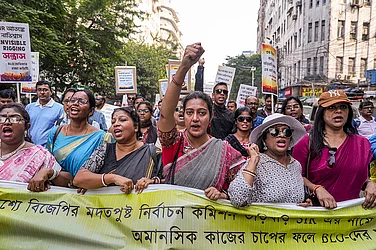The venomous, many-headed virus, in its indiscriminate torrent, swallowed livelihoods whole, especially those deeply tied to human contact—travel and tourism were the first to fall prey, so too did restaurants and bars. These are lately showing signs of flickering back to life, buoyed by the imperatives of a ‘new normal’. Yet, an industry whose stock in trade is that most intimate of human acts, its purveyors denizens of a shadowland, cowers atill in darkness and neglect.
The red-light area of Gokulnagar in Sangli, Maharashtra, lies frozen in inactivity even at 8 pm, when it normally heaves with people. The empty streets echo only with sounds of police cars out on Covid duty. A few souls, intent on seeking the usual services, slink away at their sight. As night falls, the women at the doorsteps retire to their rooms. Another grim day draws to an end. Sex workers across India share their desperation.
ALSO READ: Sonagachi The Red Balloon
With no work, life has been harsh in the past eight months, says Kiran Deshmukh, a sex worker based in Sangli. After being shut for over six months, brothels opened in September. “But it is picking up very slowly,” says Kiran, president of the National Network of Sex Workers (NNSW), a collective led by workers. Masks and sanitisers, as elsewhere, are made necessary accoutrements of the trade, yet have helped little to inspire confidence. Around 600 inmates would stay in the large establishment where Kiran lives. Intense hardship—inability to pay rent being the obvious outcome—has forced many to return to their villages.
The community is ravaged, says Sudhir Patil, an MSM (men who have sex with men) sex worker. With Sangli a stop on the highway connecting Maharashtra and Karnataka, his clients were mostly truck drivers. As Covid restrictions have hit traffic, incomes are gone. It is a struggle to get life back on track, adhering to all protective measures, says Patil.
“When HIV raged, we started using condoms. Now, masks and other precautions are compulsory. Customers are allotted only a limited time, and kissing is a big no,” says Patil, who is associated with the NGO Muskan. Though Patil has moved his business to online and video calls, not everyone can afford a smartphone, he says. Connectivity and privacy issues are also a deterrent.
If the pandemic has exposed the utter vulnerability of our working class, among the hardest hit were ‘invisible’ sex workers excluded from government schemes. For an industry barely acknowledged, even a modest trickle of the relief package announced by the Centre did not reach them. Their lives are lit by the red light of ineligibility and moral damnation.
“We survived the lockdown with the help of Sampada Gramin Mahila Sanstha (SANGRAM, an NGO), which fed us and were our lifeline,” says Kiran. After months of unrelenting doom, the Supreme Court took cognizance of the plight of sex workers in September following a petition from NGOs. The SC ordered state governments to provide dry rations to sex workers.
Amid the gloom, the National Human Rights Commission’s (NHRC) advisory in October, recognising sex workers as informal workers, brought some cheer to the community. The advisory directed various ministries to issue temporary documents so that workers can access welfare schemes and health services. For many, it was the culmination of a long-drawn struggle. Meena Seshu of SANGRAM says it’s a significant step towards autonomy and dignity of women. “It is a huge step; this will end exploitation, they will be entitled to government schemes, medical and legal aid…,” she says.
However, the advisory has met with stiff, albeit rational, opposition. While social activist and founder of the anti-trafficking and advocacy organisation Prajwala, Sunitha Krishnan, demanded its withdrawal, saying it will legitimise sex work, others favoured criminalising middlemen and brothel owners. On November 11, the NHRC issued a modified advisory, retaining the status of sex workers as “women at work”, but removing the registration clause as informal workers. The new advisory says that such workers may be provided benefits on humanitarian grounds that are entitled to informal workers.
Many activists and sex workers unions have welcomed the modified advisory. “Doing away with registration doesn’t make much of a difference. They are still under ‘women at work’ category”, says Seshu. “It’s about dignity of work. We are regarded as ‘immoral’ people. With informal worker status, this will change. We can receive benefits, as many of us don’t possess ration or Aadhar cards or other proofs of identity,” says Kiran.
Ayeesha Rai, a Delhi-based sex worker from West Bengal, agrees that it would help end the fetid stigma. Like her colleagues, Ayeesha, a NNSW coordinator, is surviving on loans taken on exorbitant interest rates for the past six months. Ayeesha, who took up sex work of her own volition, doesn’t advocate legalising sex work, while abhorring the perception of sex workers as victims to be rehabilitated. “Our demand is for decriminalisation, which will stop the abuse and exploitation. We want safe working conditions and informal work status will ensure it,” she says.
Activists also argue that a clear distinction is needed between sex work and trafficking—a grave crime. Nisha Gulur of the Karnataka Sex Workers Union says that sex work should be treated like any other job. “It’s an adult choice and they take it up willingly,” she says, adding that under the Immoral Traffic (Prevention) Act, sex work is not illegal.
Devi, a sex worker from Guntur, Andhra Pradesh, also demands a delink between trafficking and sex work. “The NHRC advisory is a necessary recognition,” she says. However, she dispels the argument that formal recognition of sex work will legitimise middlemen and brothels. “Brothel owners and pimps are part of the system. They give us a safe place and protect us from abuse and harassment,” she says.
Devi entered the profession at the hard end of a bad marriage, to fend for her two children. Now, her educated daughter and son respect their mother’s choice of work. “I have no qualms or regret. It is not only about money, but fulfilment of my physical needs too. I was able to educate my children like any other government servant.”
Most sex workers in Andhra are neck-deep in debt and are unable to find an alternative livelihood, says Meera Raghavendra of Women’s Initiatives. “Though the government gives sops to the poor, sex workers are never included. It is discriminatory,” she says.
The suffering endured by Jayashree, a sex worker from Kerala, is typical of many. With her village in Thrissur under lockdown, Jayashree, the sole breadwinner of an eight-member family, survives on cadged borrowings. “My clients are scared and I don’t want to take risks. Many clients have lost jobs,” she laments. In her mid-50s, Jayashree is clueless about finding alternative means of subsistence.
With the NHRC advisory giving a semblance of dignity to sex work, Jayashree and others hope the coming generations will respect their work and treat them as respectable humans.


























